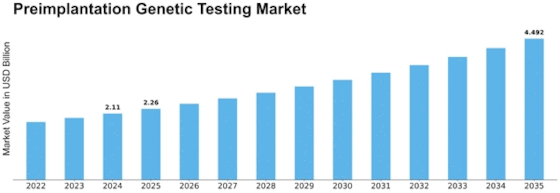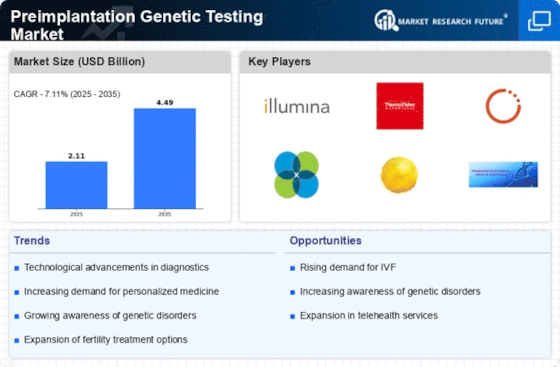Preimplantation Genetic Testing Size
Preimplantation Genetic Testing Market Growth Projections and Opportunities
Preimplantation Genetic Testing Market to Reach USD 0.65 Billion at 10.2% CAGR from 2023-2032. Several variables influence the Preimplantation Genetic Testing Market and drive its growth. Awareness and demand for sophisticated genetic testing technology in assisted reproduction techniques are major factors. As more people and couples seek reproductive treatments, PGT's importance in in vitro fertilization has grown. Advanced genetic screening methods can detect genetic defects in embryos before implantation, improving the likelihood of successful pregnancies and minimizing the danger of hereditary illnesses.
Genetic testing technology drives market dynamics. Development of high-throughput sequencing, array-based technologies, and comprehensive genetic screening methodologies improves PGT accuracy and efficiency. These technological advances improve PGT diagnostics, making it essential to fertility treatments and family planning.
Regulatory factors shape the PGT business, assuring genetic testing safety and ethics. Genetic test approval, use, and reporting are regulated, ensuring ethical industry practices and patient rights. These restrictions maintain PGT findings' credibility and build confidence among healthcare providers and reproductive patients.
Healthcare expenditures and insurance coverage affect PGT adoption. PGT's cost-effectiveness and promise to lessen the economic burden of repeated IVF cycles and genetic disease treatment make it appealing to healthcare providers and payers. Market changes and economic variables affect advanced PGT technology availability.
PGT services are offered by diagnostic laboratories and biotechnology firms in the market. Competition drives innovation, with firms enhancing diagnostic methods, increasing genetic screening, and delivering full genetic disease remedies. Diversity in PGT services lets healthcare professionals and individuals chose what they need, creating a dynamic market.
Healthcare professionals and the public learn about PGT through educational programs, which affect market dynamics. Training, educational campaigns, and counseling services promote educated decision-making for fertility patients about PGT's advantages and ethics. These projects promote PGT as a reproductive medicine technique.
Demographics including parental age and genetic diseases affect market patterns. As mothers delay childbearing and chromosomal disorders develop with age, PGT services are in demand. Due to genetic health awareness and the desire for safe babies, sophisticated genetic screening technologies are in demand.



















Leave a Comment